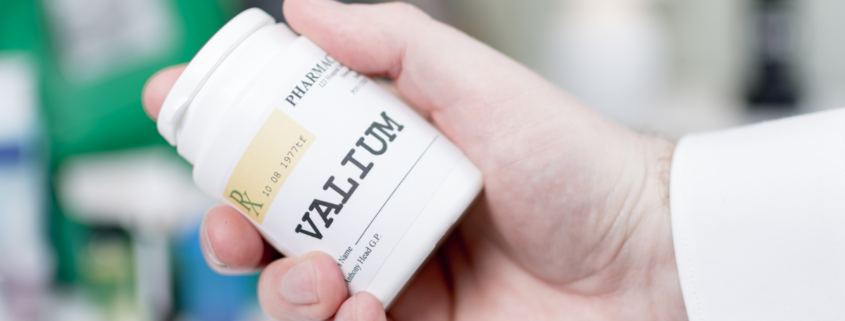Is Valium Addictive
Table of Contents
Valium is a type of sedative from the benzodiazepine family of drugs. It is designed to help patients who struggle with anxiety disorder, insomnia, muscle spasms, and seizures. Some individuals misuse Valium, exceeding the prescribed dosage or using it recreationally. So, is Valium Addictive? To learn about the causes, symptoms, and treatment options for Valium addiction, please read on.
What is Valium?
Individuals who are dealing with transient anxiety, muscle spasms, or convulsive disorders are grateful for a medication that relieves troubling symptoms. Valium (diazepam) is a long-acting benzo that slows the central nervous system and induces a calm, relaxed state.
Valium works by activating the brain chemical GABA, which affects electrical and chemical activity. This calms the nervous system and provides fast-acting relief for someone with anxiety or insomnia.
Taken as prescribed for a short period of time, Valium can provide much desired relief.
However, because of its high potential for dependency and addiction, Valium is not intended for long-term use due. It is a Schedule IV controlled substance and is tightly monitored as such.
How Does Valium Lead to Addiction?
Valium is often misused recreationally. People obtain the drug through illicit channels to obtain a high. They may combine Valium with other substances to enhance or offset the effects of the other drug. Misuse of Valium involves taking high doses of the pills, or crushing the pills and snorting it.
Wondering is Valium addictive? Yes, addiction to Valium can occur in just two weeks of continuous use, due to its reinforcing effects. The brain’s reward system records the relaxing effects of Valium as something desirable to be repeated, which spurs continued use. As tolerance builds, the person takes higher or more frequent doses to obtain those desired results.
Anxiety Disorder and Valium Addiction
If you wonder, “Is Valium addictive,” the answer is yes. Because Valium is often prescribed for the treatment of anxiety, there is a risk that the patient develops a psychological dependence. This happens when the person comes to anticipate the need for the drug before ever experiencing any symptoms. They believe they need the drug just to function. With continued use, Valium addiction sets in.
Signs of Valium abuse or addiction include:
- Increased tolerance to the effects of Valium
- Being obsessed with having enough Valium on hand
- Going to great lengths to obtain Valium, such as doctor shopping
- Valium cravings
- Decreased libido
- Use of the drug in situations that are known to be risky, such as driving or operating machinery
- Memory loss
- Slurred speech
- Slow response, drowsiness
- Sleeping more than usual
- Reduced productivity due to the sedating effects
- Lying about how much Valium you are taking
- Irritability
- Fatigue
- Agitation
- Experiencing manic moods
- Impaired motor coordination
- Forgetfulness
- Being unable to cut back on or quit the Valium
- Experiencing withdrawal signs when the Valium wears off
Valium Withdrawal
Once someone has become dependent or addicted to Valium they are not able to just quit the drug cold turkey. All benzos are very difficult to withdraw from, including Valium. To achieve a safe Valium detox and withdrawal, a medical detox team must oversee the process.
This is accomplished through a drug-tapering plan. A taper involves a two to three-week schedule during which the individual takes gradually lower does. Although this adds time to the detox process, it is the only way to avoid severe withdrawal symptoms.
Common Valium withdrawal symptoms might include:
- High blood pressure
- Rapid heart rate
- Headache
- Sweating
- Tremors
- Nausea
- Vomiting
- Abdominal cramping
- Diarrhea
- Irritability
- Anxiety
- Insomnia
- Mood swings
- Cravings
- Dizziness
- Malaise
- Panic attack symptoms
- Seizures
- Suicidal thoughts
Once the detox has been completed, it is time for the rehabilitation process. This is the treatment phase when the person learns new ways to manage anxiety, cravings, or triggers.
Valium Addiction Treatment
The path to addiction recovery involves participating in several evidence-based therapies that guide you toward a Valium-free life. Rehab provides a comfortable and structured setting where you can focus on attaining the tools you’ll need to succeed in recovery.
The residential treatment program offers a higher level of care for those with a long-standing Valium addiction. This setting allows you to take a break from the stress of daily life to spend your time healing. Once you have completed treatment, you’ll be ready to step down to the outpatient program.
Here is what you can expect in residential treatment:
- Psychotherapy. You will meet one-on-one with a therapist to learn new ways to respond to triggers. Triggers may be related to anxiety and stress, or Valium cravings. Using CBT, DBT, and other evidence-based therapies, you will learn how to shift your thoughts and behaviors.
- Group Therapy. In the group therapy setting, you join peers in recovery to discuss various topics relevant to Valium addiction recovery.
- Family Therapy. Since most people live within a family system, these sessions provide an opportunity to improve the family dynamic.
- Education. Classes provide useful information about how drugs impact brain chemistry and lead to addiction. Relapse prevention strategies are also provided in these classes.
- 12-Step Program. The 12-Step program provides a time-honored set of benchmarks to guide the recovery process.
How to Manage Anxiety Without Valium
For those who struggle with anxiety, a key metric for Valium recovery involves learning new ways to manage stress. Holistic techniques help to reduce stress, which is essential for avoiding relapse.
Here are some effective methods for managing stress and anxiety:
- Yoga. The movements, positions, and breath work all work to help you get to a calm state of mind.
- Deep breathing. One of the fastest methods to achieve relaxation is through focused breathing techniques.
- Meditation. There are several ways to practice meditation, including mindfulness, guided imagery, and focused meditation.
- Aromatherapy. Essential oils can be used on a daily basis to help obtain a peaceful, calm state of mind. Lavender, rose, and bergamot are examples.
- Smartphone apps. Check out the various smartphone apps that are designed to help you manage daily stress.
- Exercise. Daily exercise helps stimulate brain chemicals that aid in relaxation and stress relief.
Annandale Luxury Rehab Valium Addiction Treatment
Annandale Behavioral Health provides supportive and comprehensive treatment for individuals struggling with Valium. If you are asking, “Is Valium addictive?” then you are likely noticing symptoms in yourself or a loved one. Please reach out today at (855) 778-8668 for a free consultation.







